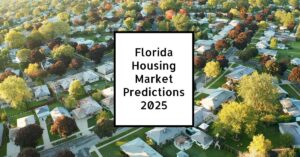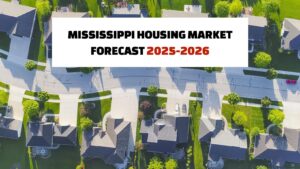The Kansas housing market forecast for 2025 is optimistic, as home prices are projected to rise by 6%, marking a continued growth trajectory despite challenges such as elevated financing costs and cautious buyer sentiment. This increase reflects a resilient housing market characterized by persistent demand and limited inventory. While navigating this landscape may require deliberation, the overall outlook suggests a balanced market that can accommodate both buyers and sellers.
Kansas Housing Market Forecast 2025
Key Takeaways
- Home Prices: Anticipated to increase by 6% in 2025.
- Home Sales: Expected to stabilize with a 3.3% increase in sales volume.
- Construction Activity: New single-family building permits forecast to decline 1.6% in 2025, totaling around 5,090 units.
- Market Conditions: Tight inventory and higher prices create a more balanced market atmosphere.
- Regional Variability: Different regions in Kansas show diverse growth rates, with metropolitan areas experiencing varying levels of price increases.
Current State of the Kansas Housing Market
Understanding the current conditions leading into 2025 is essential to grasp the Kansas Housing Market Forecast. According to a report from the Wichita State University Center for Real Estate, home prices in Kansas have been witnessing substantial growth. In 2024, home prices increased by 7.9%, and a subsequent growth of 6% is expected in 2025 (Wichita State University, 2024).
Dr. Stan Longhofer, the director of the WSU Center for Real Estate, explained, “Inventories of homes available for sale remain quite tight. At the same time, buyers remain cautious in the face of higher home prices and financing costs.” This cautious attitude among buyers stems from the rising mortgage rates, which significantly influence purchasing power and buyer confidence.
The stabilization of home sales activity in the first half of 2024 indicates that the market is beginning to adjust. Home sales across the state are projected to decline slightly this year before rebounding in 2025, with an expected 3.3% increase in home sales volume, totaling about 36,080 units sold across Kansas.
Forecasted Home Values and Sales
The average home value in Kansas currently stands at approximately $230,021, showing an increase of 4.9% over the previous year. Homes are selling quickly, with an average of only 11 days on the market before going pending (Zillow, 2024). This swift turnover is indicative of buyer interest despite higher price points.
Dr. Longhofer's forecast also highlights the expectation for residential construction to continue to grow over the coming year, albeit with some data suggesting a slight pullback. New single-family building permits are anticipated to rise by 5% this year, reaching 5,175 units, before a small retreat to 5,090 units in 2025, a decline of 1.6%. This reflects the ongoing challenge of meeting rising demand with an adequate supply of new homes.
Regional Insights: Growing Areas and Declining Prices
The Kansas housing market is diversified, with specific areas showing unique growth potential. The following are key insights into forecasted home price changes across major metropolitan areas, based on projections by Zillow from September 2024 through August 2025:
- Wichita is expected to see home prices increase by about 2% due to ongoing demand and a limited supply of homes.
- Topeka is projected to experience a growth of 2.6%, driven by the local economy and housing preferences.
- Lawrence anticipates a positive but modest price growth of about 1.7%, influenced by its status as a college town.
On the flip side, certain regions are expected to face price reductions:
- Manhattan foresees a drop in home values by 0.7%, possibly due to regional economic adjustments and changes in demographics.
- Garden City may see a projected decline of 0.4%, which indicates localized challenges in attracting new residents or maintaining current housing demand.
These insights highlight the importance of localized research when considering home purchases or investments.
Kansas Home Price Forecast by Region
| Region | Projected Price Growth (Sept 2024) | Projected Price Growth (Nov 2024) | Projected Price Growth (Aug 2025) |
|---|---|---|---|
| Wichita, KS | 0.4% | 0.3% | 2.0% |
| Topeka, KS | 0.3% | 0.4% | 2.6% |
| Manhattan, KS | 0.3% | 0.0% | -0.7% |
| Lawrence, KS | 0.4% | 0.5% | 1.7% |
| Hutchinson, KS | 0.2% | 0.0% | 1.1% |
| Salina, KS | 0.1% | -0.1% | 0.4% |
| Garden City, KS | -0.1% | -0.4% | 0.0% |
| Pittsburg, KS | 0.5% | 0.8% | 3.3% |
| Emporia, KS | 0.2% | 0.1% | 1.7% |
| Dodge City, KS | 0.2% | 0.6% | 3.5% |
| Coffeyville, KS | 0.6% | 1.0% | 1.6% |
| McPherson, KS | 0.1% | -0.3% | -0.8% |
| Hays, KS | 0.2% | -0.2% | -0.7% |
| Ottawa, KS | 0.4% | 0.6% | 3.1% |
| Great Bend, KS | 0.4% | 0.5% | 1.4% |
| Liberal, KS | 0.2% | -0.2% | -1.5% |
| Parsons, KS | 0.3% | 0.6% | 1.8% |
| Atchison, KS | 0.2% | 0.0% | 2.9% |
Kansas Housing Market Outlook
Key Highlights
Average Home Value: $230,021
Median Sale Price: $300,067
Projected Growth: Home prices rising by 6%
Regions Poised for Growth
| Region | Forecasted Growth |
|---|---|
| Wichita | 2% |
| Topeka | 2.6% |
| Lawrence | 1.7% |
Regions Facing Decline
| Region | Forecasted Decline |
|---|---|
| Manhattan | -0.7% |
| Garden City | -0.4% |
Market Sentiment
Overall Sentiment: Continuous moderate growth expected across Kansas.
Inventory Challenges: Ongoing tight market conditions prevent easy access to homes.
Market Dynamics and Outlook Towards 2026
Examining the potential for housing prices to drop or crash in the future reveals that while some fluctuations are likely, a full-fledged market crash appears unlikely at this juncture. The convergence of tight inventory and sustained buyer interest suggests a resilient market that can withstand economic pressures.
Towards 2026, the market is projected to maintain growth but at a slower pace compared to the rapid increases noted in recent years. Economic conditions—including fluctuating mortgage rates, employment trends, and an evolving demographic landscape—will play a vital role in shaping housing market stability. Continued vigilance among buyers and sellers will be essential to navigate the potential challenges and seize opportunities.
Influence of External Factors on Housing Prices
A multitude of external factors influences the Kansas housing market and shapes its future trajectory. These elements include:
- Interest Rates: Rising mortgage rates often lead to higher monthly payments, affecting buyer affordability and demand. Potential homeowners may be more selective due to these increased costs, placing downward pressure on prices if demand diminishes significantly.
- Employment Rates: Strong job growth in any region typically correlates with heightened demand for housing. Conversely, job losses or stagnation can lead to reduced buyer interest, directly impacting home sales and prices.
- Population Trends: Migration patterns significantly influence housing demand. In Kansas, areas with growing populations due to new job opportunities or quality of life factors are likely to see stronger price increases.
- Government Policies: Incentives such as tax breaks for first-time homebuyers, changes in property tax laws, and zoning changes can either facilitate or impede housing market growth.
My Personal Take on the Forecast
From my perspective, the Kansas housing market presents a captivating blend of challenges and opportunities. While cautious optimism should guide prospective buyers, the prevailing trend of home price appreciation signals foundational strength within the market. This environment encourages intelligent strategies, like looking at growth areas that may provide more affordable options in terms of long-term value.
In conclusion, the Kansas housing market is poised to navigate its way through upcoming challenges while demonstrating resilience and gradual growth. Buyers, sellers, and investors must keep abreast of evolving market trends to maximize their opportunities and make informed decisions in this dynamic environment. By understanding these insights and observations, stakeholders can better prepare for a robust housing market in 2025.











